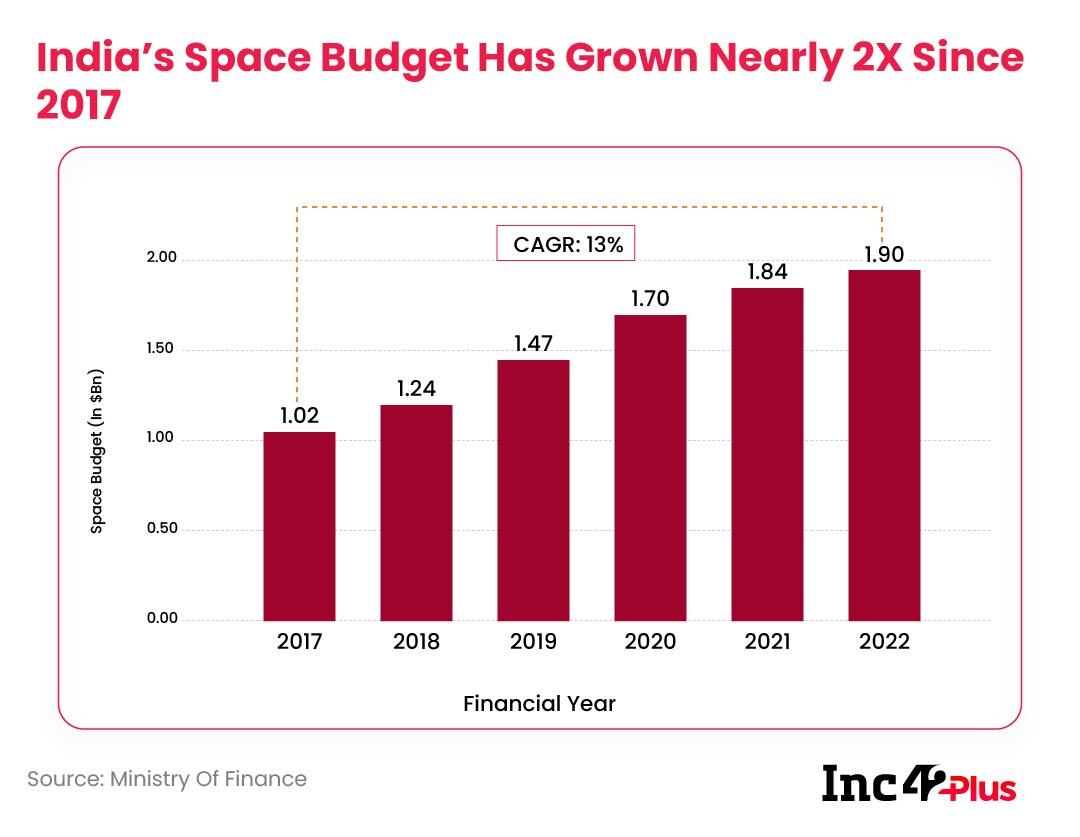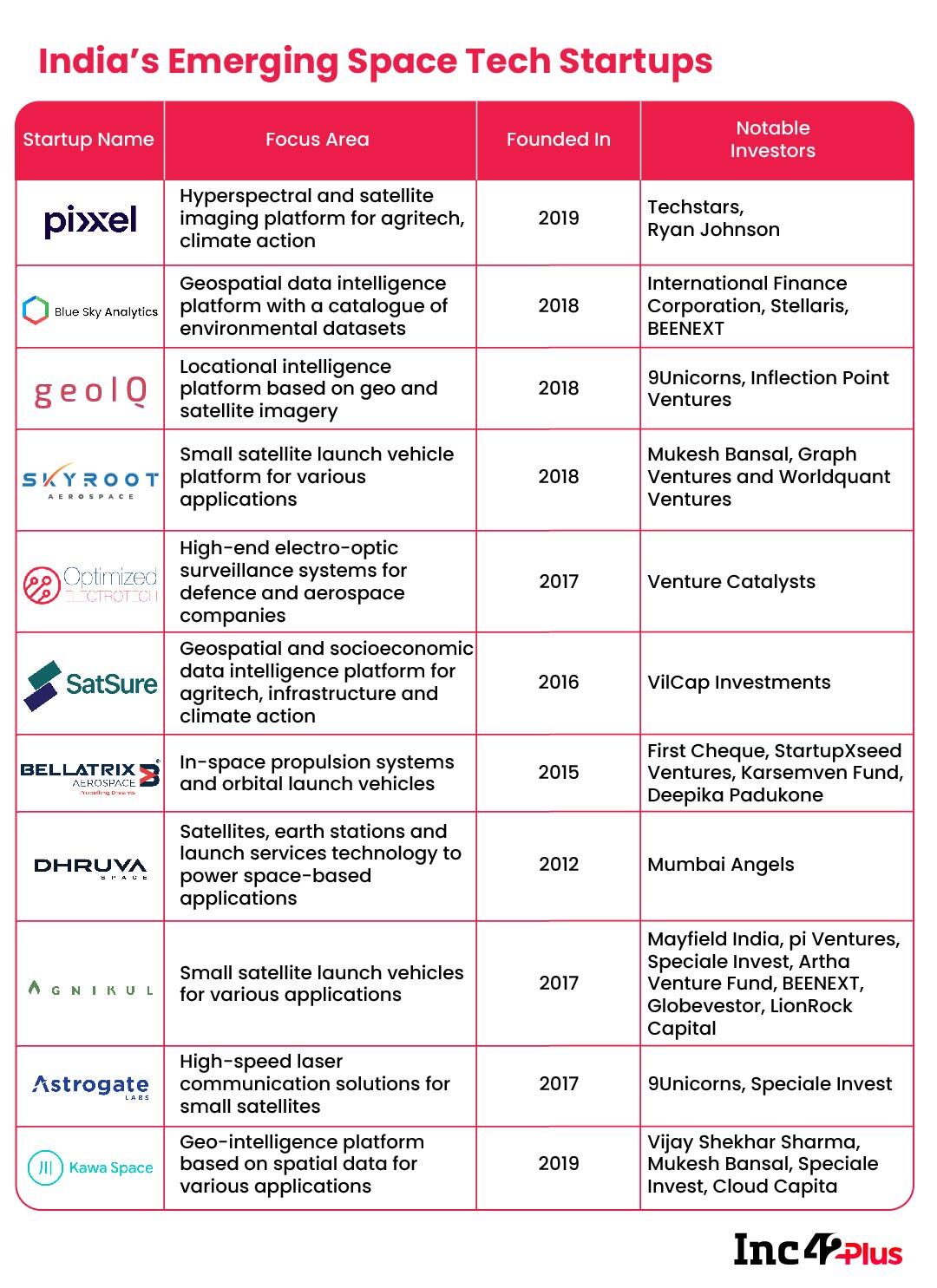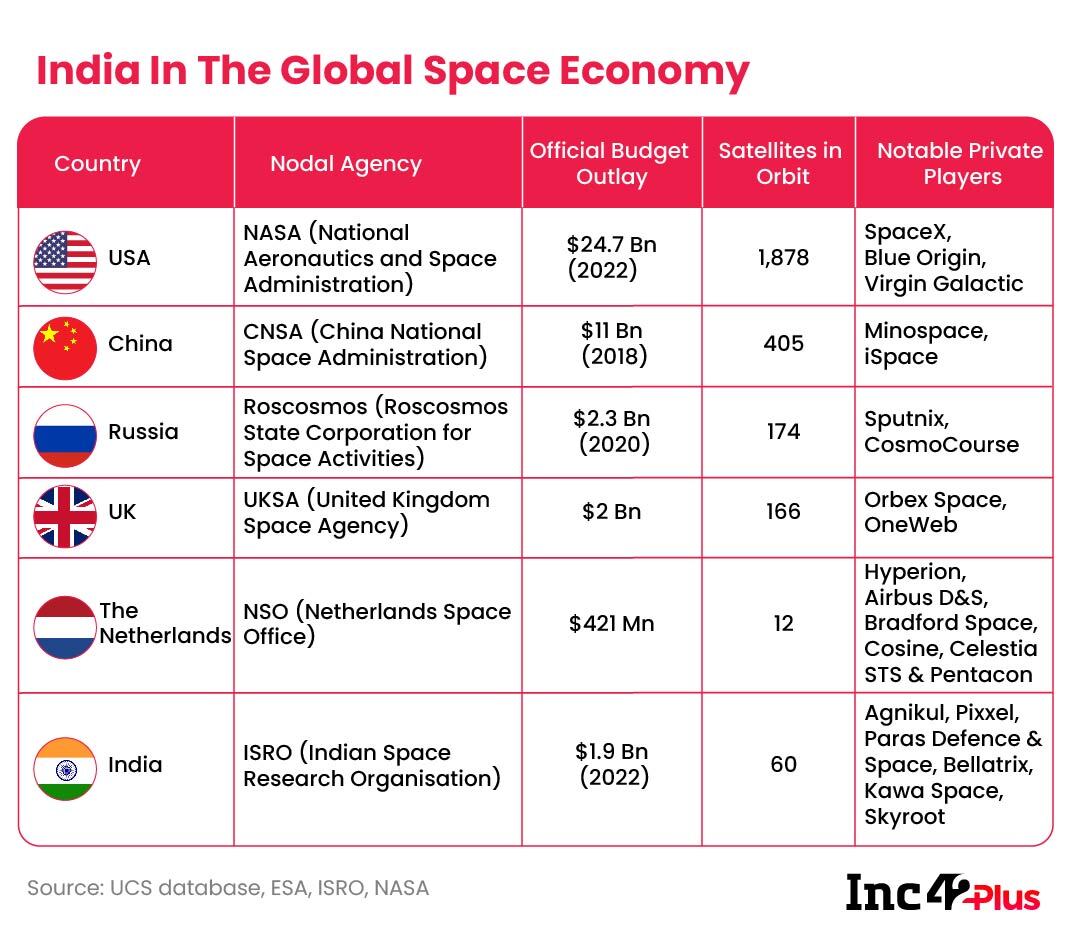Time for spacetech startups to stand up and be counted with the launch of Indian Space Association
In 2022, India’s space programme will turn 60 and it will be the 50th anniversary for the Indian Space Research Organisation (ISRO), which was founded in 1972. As the venerable institution enters the seniority phase, India’s spacetech ambitions are being handed over to startups.
The transition has been a long time coming and one that startups — even those beyond spacetech — have called for. It began last year with the launch of the Indian National Space Promotion and Authorisation Centre or IN-SPACe, which was seen as a precursor to the Indian Space Association (ISpA) launched this week by the central government.
ISpA is envisioned as a platform to bring public and private spacetech players together to boost India’s space industry. According to one space communications startup founder that we spoke to, this is the biggest signal yet that spacetech startups are on the government’s radar.
Startups, ISRO and other bodies will work together to take India’s space programme to the next level, but the wheels have been in motion for nearly two years already.
India’s Space Ambitions
While the pot is boiling in 2021, the efforts began in 2018, when ISRO announced plans to launch incubators across India to groom spacetech startups. Besides ISRO, the Kerala Startup Mission (KSUM) is also bolstering the growth of spacetech startups in India with the Kerala Space Park (KSP), which was established in the state’s capital.
In 2019, the KSP launched STADE (Space Technology Application Development Ecosystem) which is backed by ISRO’s Vikram Sarabhai Space Center and Airbus Bizlab.
Things were looking up at the end of 2019 thanks to the relative success of the Chandrayaan mission, but 2020 reset all expectations as Covid disrupted space operations, tech conventions, roadshows and space missions.
As per Inc42 research, India has more than 120 active startups in the spacetech sector, with around 64% of space or aerospace startups launched in or after 2014. From propulsion and rocket technology ventures such as Bellatrix to satellite makers such as Dhruva Space and Team Indus to the likes of Agnikul, Skyroot, Astrogate, Kawa Space and others.
This new wave of space technology startups breaking off across India has been largely made possible due to a reduction in launch costs and ISRO’s continued efforts for promoting entrepreneurship in the country.

“The Indian space ecosystem is undergoing several policy reforms to engage private players and attract innovation and investment… The recent reforms announced by the government of India for unlocking the space potential of India stresses the need to enable the private industry to be the co-traveller in India’s space journey,” the national economic survey said in January this year.
ISRO chairman K Sivan has said in the past that demand for space-based applications and services is growing and ISRO is unable to cater to this by itself. The need for satellite data, imagery and space technology is felt across sectors.
According to Sivan, ISRO would have to be expanded 10 times to meet the growing demand, which is why the government has now opened the doors for spacetech startups to actively develop for various applications.
India’s Spacetech Startups Stand Up
The Indian commercial space tech market offers a huge addressable opportunity of over $77 Bn by 2030, according to an Inc42 analysis.
In June 2020, IN-SPACe came about — heralded as a big bang policy change, the nodal agency has been instituted to authorise and regulate private innovation in spacetech.
It has been tasked with examining the extent to which private players can contribute to the space sector, across a range of functions such as establishing ground stations to satellite constellations, to specialised sensors and devices to providing applications and services for spacetech operations.
Soon after, Bengaluru-headquartered spacetech startup Pixxel signed a pact with ISRO to launch its first satellite on a polar satellite launch vehicle (PSLV) rocket earlier this year. The startup is building a constellation of earth-imaging small satellites, promising to furnish 24-hour global coverage, data from which can be used for actionable insights across sectors.
Besides Pixxel, Chennai-based Agnikul has also signed deals with ISRO to access its facilities and gain tecnical expertise to build rockets for satellite launches. The IIT Madras-incubated startup is building vehicles for on-demand micro and nano-satellite launches to low Earth orbit.

With IN-SPACe startups such as Astrome Technologies, Dhruva Space and Skyroot sought permissions for space-based applications, satellite making and development and launch of rockets.
Reports last year indicated 22 Indian firms and four global companies have sent their applications to IN-SPACe, seeking approval for various space-based applications. The global firms include Amazon, Bharti Airtel-owned OneWeb, the United Arab Emirate’s Archeron Group and Norway’s Kongsberg Satellite Services.
Among Indian startups, Skyroot grabbed headlines by becoming the first Indian company to test-fire an upper stage rocket engine and is developing launch vehicles (rockets) to provide affordable orbital launch service to the satellites of its customers.
Beyond space operations and mission support, startups are enabling companies and businesses on the ground to leverage satellite imagery and more for their operations. Mumbai-based Kawa Space, which raised Pre-Series A funding from Paytm founder Vijay Shekhar Sharma in 2019, builds and operates infrastructure in space on behalf of enterprise and corporate clients.
Founded by Kris Nair and Bala M in 2019, Kawa Space’s earth observation satellites are used by customers in financial services, government departments, strategic risk management and agriculture. The company has also won a contract to build more than 27 satellites for the Indian government.
Space Sector Attracts Global Giants
Now, thanks to IN-SPACe, a host of Indian as well as foreign companies, both big firms and nascent startups, have sought official permission before making their moves. Which is why startups feel ISpA is critical as it opens up more opportunities for private players, especially allowing Indian companies to find pathways to expand abroad and cater to international space programmes.
In October 2020, ISRO released a draft Space Communications Policy, which encouraged policy measures to boost private participation in the space communications sector. The policy talks about the need to harness satellite communications by making it easier for private players to introduce satellite broadband.
Some of the policy measures outlined in ISRO’s draft paper talked about re-assigning unused orbital resources to entities that are better prepared to use them, involving the Indian industry.
Following this, in November, aerospace giant Elon Musk’s SpaceX asked the Indian government to facilitate approvals for the use of satellite technology to further internet access in remote rural areas of the country through its Starlink service.
SpaceX was part of a TRAI consultation paper on enhancing broadband access and penetration in India. The company’s representation to TRAI can be seen as an indication of its plans for launching Starlink in India in the near future.
What Will ISpA Change?
With so much already underway in India with the launch of IN-SPACe, what exactly can the spacetech ecosystem expect from ISpA now? Is it just about doubling down on private sector development?

At the launch this week, the Indian government said ISpA is based on four pillars — the government as the enabler, the private sector as innovators, students and engineers as future talent, and space data being a resource for progress in several disparate sectors.
According to the founder of a satellite launch startup, the most critical aspect will be in building up talent capacity at a college level and beyond.
Most aspiring space and aerospace engineers come through IITs and other premier engineering institutions in India, but for spacetech to become a mainstream opportunity, the need is to introduce related concepts at an earlier stage — perhaps even in school curricula.
This is essentially what countries such as the US do, where NASA’s missions and programmes are often part of school lessons, which inculcates a pride and feeling of belonging among students and the youth.
This is the right time for India to follow this model. After all, the global recognition for missions like Mangalyaan (Mars) and Chandrayaan (Moon) in the past three years has been quite resounding. That just might be the foundation for creating a legacy of Indian spacetech.
However, the biggest potential benefit of ISpA — not a given, since it’s still early days — is the ready ramp that it gives Indian startups to play a more significant role in the global space economy.
The high-profile launches by SpaceX and Blue Origin this year show that even as India is getting ready for the private sector leap, the opportunity is more or less ripe for picking in the US and Europe. And India’s startups can finally have their piece of it.
Till next week,
Nikhil Subramaniam
Images: Gayatri Sharma













![[The Outline By Inc42 Plus] Startups Grab The Spacetech Baton -Inc42 Media](https://asset.inc42.com/2023/09/featured.png)
![[The Outline By Inc42 Plus] Startups Grab The Spacetech Baton -Inc42 Media](https://asset.inc42.com/2023/09/academy.png)
![[The Outline By Inc42 Plus] Startups Grab The Spacetech Baton -Inc42 Media](https://asset.inc42.com/2023/09/reports.png)
![[The Outline By Inc42 Plus] Startups Grab The Spacetech Baton -Inc42 Media](https://asset.inc42.com/2023/09/perks5.png)
![[The Outline By Inc42 Plus] Startups Grab The Spacetech Baton -Inc42 Media](https://asset.inc42.com/2023/09/perks6.png)
![[The Outline By Inc42 Plus] Startups Grab The Spacetech Baton -Inc42 Media](https://asset.inc42.com/2023/09/perks4.png)
![[The Outline By Inc42 Plus] Startups Grab The Spacetech Baton -Inc42 Media](https://asset.inc42.com/2023/09/perks3.png)
![[The Outline By Inc42 Plus] Startups Grab The Spacetech Baton -Inc42 Media](https://asset.inc42.com/2023/09/perks2.png)
![[The Outline By Inc42 Plus] Startups Grab The Spacetech Baton -Inc42 Media](https://asset.inc42.com/2023/09/perks1.png)

![[The Outline By Inc42 Plus] Startups Grab The Spacetech Baton -Inc42 Media](https://asset.inc42.com/2023/09/twitter5.png)
![[The Outline By Inc42 Plus] Startups Grab The Spacetech Baton -Inc42 Media](https://asset.inc42.com/2023/09/twitter4.png)
![[The Outline By Inc42 Plus] Startups Grab The Spacetech Baton -Inc42 Media](https://asset.inc42.com/2023/09/twitter3.png)
![[The Outline By Inc42 Plus] Startups Grab The Spacetech Baton -Inc42 Media](https://asset.inc42.com/2023/09/twitter2.png)
![[The Outline By Inc42 Plus] Startups Grab The Spacetech Baton -Inc42 Media](https://asset.inc42.com/2023/09/twitter1.png)




 Ad-lite browsing experience
Ad-lite browsing experience